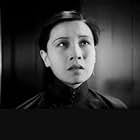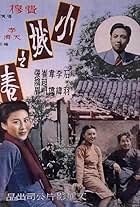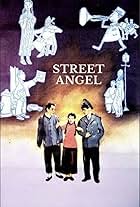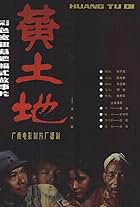IMDb RATING
7.7/10
2.6K
YOUR RATING
Street walker by night, devoted mother by day, a woman fights to get her young son an education amid criminal and social injustice in China.Street walker by night, devoted mother by day, a woman fights to get her young son an education amid criminal and social injustice in China.Street walker by night, devoted mother by day, a woman fights to get her young son an education amid criminal and social injustice in China.
- Awards
- 1 win total
Lingyu Ruan
- The 'Goddess'
- (as Ruan Ling-Yu)
Zhizhi Zhang
- The 'Boss'
- (as Zhang Zhizhi)
- Director
- Writer
- All cast & crew
- Production, box office & more at IMDbPro
Featured reviews
I am a modern film viewer. In part, this means that I have the curse of looking at the package as well as its contents. It matters to me how the thing is made, and how that making is reflected in the narrative proper.
All of us are now. That's why if you want a film with essentially none of what I call folding and still be a fine film you have to go to an old one.
This has that quality in fine degree. And it has something else to captivate. It was made in China before the communists took over. It was a time of great poverty and everyone in China would have been aware of this. It is in fact why the communists were tolerated at first, under they secured absolute power. Its this social fabric that the film mines, even exploits. Its all gone now, would be shortly after the film was made.
But if you can transport yourself into the simple story, you can transport yourself into a whole unique nation of a few thousand years that blinked out.
The acting is quite film, by western and even modern standards.
Ted's Evaluation -- 3 of 3: Worth watching.
All of us are now. That's why if you want a film with essentially none of what I call folding and still be a fine film you have to go to an old one.
This has that quality in fine degree. And it has something else to captivate. It was made in China before the communists took over. It was a time of great poverty and everyone in China would have been aware of this. It is in fact why the communists were tolerated at first, under they secured absolute power. Its this social fabric that the film mines, even exploits. Its all gone now, would be shortly after the film was made.
But if you can transport yourself into the simple story, you can transport yourself into a whole unique nation of a few thousand years that blinked out.
The acting is quite film, by western and even modern standards.
Ted's Evaluation -- 3 of 3: Worth watching.
The Goddess (1934)
*** 1/2 (out of 4)
Extremely good silent drama from China about a devoted and loving mother (Lingyu Ruan) who wants the best for her young child so by night she works as a prostitute. This leads her to take all sorts of abuse by the other women in her area but worse of all is the abuse she takes from a man (Zhizhi Zhang) who pretty much takes possession of her. THE GODDESS is without question a true gem and certainly one of the best Chinese pictures I've seen from this era. It's easy to see why this film was such a hit in China when it was originally released and especially when one learns that many women in that era were working as prostitutes to support themselves. Making a silent film in 1934 certainly wasn't the norm at the time but I honestly don't think this movie would have worked had there been sound. Director Yonggang Wu does a masterful job at making everything flow so well that the added words would have just taken away from its poetic beauty. The film flows from one bad situation to the next and after a while you begin to realize that whenever something nice happens for the young mother then sure enough something bad will follow. What really makes this film work so well is the amazing performance by Ruan who apparently felt many of the same emotions as this character. From what I've read, before this film she had several suicide attempts and she eventually did kill herself about a year after this picture was released. Her performance is simply one of the best from this era in any film because of the emotion and love she shows for her kid. Even better is when the pain of her situation and "job" begin to haunt her. Zhang, who plays the abusive jerk, is certainly a major snake that people will have no trouble in hating. The only negative thing is that the film never really bothers to tell us how the mother got into this situation and there's really no explanation as to why she doesn't try doing something else. Still, THE GODDESS is without question a real gem with one of the best performances that you're going to see.
*** 1/2 (out of 4)
Extremely good silent drama from China about a devoted and loving mother (Lingyu Ruan) who wants the best for her young child so by night she works as a prostitute. This leads her to take all sorts of abuse by the other women in her area but worse of all is the abuse she takes from a man (Zhizhi Zhang) who pretty much takes possession of her. THE GODDESS is without question a true gem and certainly one of the best Chinese pictures I've seen from this era. It's easy to see why this film was such a hit in China when it was originally released and especially when one learns that many women in that era were working as prostitutes to support themselves. Making a silent film in 1934 certainly wasn't the norm at the time but I honestly don't think this movie would have worked had there been sound. Director Yonggang Wu does a masterful job at making everything flow so well that the added words would have just taken away from its poetic beauty. The film flows from one bad situation to the next and after a while you begin to realize that whenever something nice happens for the young mother then sure enough something bad will follow. What really makes this film work so well is the amazing performance by Ruan who apparently felt many of the same emotions as this character. From what I've read, before this film she had several suicide attempts and she eventually did kill herself about a year after this picture was released. Her performance is simply one of the best from this era in any film because of the emotion and love she shows for her kid. Even better is when the pain of her situation and "job" begin to haunt her. Zhang, who plays the abusive jerk, is certainly a major snake that people will have no trouble in hating. The only negative thing is that the film never really bothers to tell us how the mother got into this situation and there's really no explanation as to why she doesn't try doing something else. Still, THE GODDESS is without question a real gem with one of the best performances that you're going to see.
When we think of Chinese cinema, the sorts of movies that come to mind are movies like "Hero" and "House of Flying Daggers". This makes Wu Yonggang's "Shénnǚ" ("The Goddess" in English) especially worth seeing. Considered one of the all-time masterpieces of Chinese silent cinema, it focuses on a destitute woman forced to work as a prostitute to support her son. The nameless protagonist is forced to become the property of a gambler, but her troubles don't end there.
The movie reminded me of King Vidor's "Stella Dallas", about a woman forced to sacrifice everything so that her daughter can have a better life. Indeed, what the protagonist here experiences is very much like what we see in Charlie Chaplin's movies. I understand that 1930s China was a tourist trap for westerners while still beset with poverty (not to mention the war crimes that Japan committed there).
The release came not long after the publication of Pearl Buck's novel "The Good Earth", about a Chinese peasant family. Much like how that book helped expose people in the US to the lives of ordinary Chinese without the negative stereotypes commonly attributed to them, this movie shows what the Chinese peasants had to do to survive in a world where the cards are stacked against them. An important part of cinema history. I recommend it.
PS: Although Ruan Lingyu was one of China's top movie stars at the time, her life turned out to be tragic: she committed suicide of a barbiturate overdose the year after the movie's release.
The movie reminded me of King Vidor's "Stella Dallas", about a woman forced to sacrifice everything so that her daughter can have a better life. Indeed, what the protagonist here experiences is very much like what we see in Charlie Chaplin's movies. I understand that 1930s China was a tourist trap for westerners while still beset with poverty (not to mention the war crimes that Japan committed there).
The release came not long after the publication of Pearl Buck's novel "The Good Earth", about a Chinese peasant family. Much like how that book helped expose people in the US to the lives of ordinary Chinese without the negative stereotypes commonly attributed to them, this movie shows what the Chinese peasants had to do to survive in a world where the cards are stacked against them. An important part of cinema history. I recommend it.
PS: Although Ruan Lingyu was one of China's top movie stars at the time, her life turned out to be tragic: she committed suicide of a barbiturate overdose the year after the movie's release.
The Goddess was released in 1934, which is directed by Wu Yonggang. This movie is regarded as one of the best movie of China's film history. The actress, Ruan Ling-yu, became an icon of Chinese silent film for her performance in this film.
The Goddess portrayed the miserable life of a prostitute in Shanghai during the 1930s. The prostitute is shaped as one representativeness of the social marginalized group. She suffered physical as well as psychological abuse from her surrounding environment. The more she made efforts to escape from her poor life; the more cruel things happened to her. This film has not only social significance but also cultural implication; which exhibits how weak a humanitarian morality is while facing the social reality(Meyer, 2005).
The Goddess was regarded as one outstanding realism film of China's cinematic golden age (Meyer, 2005). During the period of between 1930s and 1940s, the thematic concerns of social conflict always focus on economic exploitation and political oppression in the realism film. As compared with the film with similar theme, the director of The Goddess did not place too much in revealing social exploitation and oppression. The director exhibited the social harsh through the relationship between the prostitute with other people, including her neighbours, the master of her son's school, the gangsters and other children's parents. The prostitute gained sympathy and helps from some kind people; but mostly she had to suffer the mistreatment from the evil people as well as the discrimination from the middle-class in her society. The implicit expression help director enhanced the social tragedy meaning for the disadvantaged group.
The role of prostitute was performed by Ruan Lingyu who successfully shaped a woman living a dual life. As a prostitute, she abandoned her self-respect as a woman while standing at the night street to make a deal with clients. In the other hand, she had never forgotten to take her responsibilities as a mother. For example, when she returned home with a tired face every morning, the first thing what she did was to see her son. However, his son was isolated by school peers and was required to drop out because his mother was prostitute. The prostitute became the obstacle to her son; and her basic rights as mother was deprived. The image of prostitute has double tragedy meanings. This is a silent movie. The actress, Ruan lingyu, used different body language to express duel personalities of that woman, for example, seeing through the legs of that gangster, her panic face and desperate eyes. The inner world of that character has been performed by implicit facial expression and dull body movement. Yun's body language is natural but restricted, which creates a sense of elegant and classical aesthetics.
The director has been influenced by symbolism and European pioneer films (Meyer, 2005). The approach to narration in this film does not follow the routines of traditional Chinese drama. The dramatic conflicts have not been enhanced by strong external actions and emotion tensions. The director more focuses on the character's psychological descriptions in the climax of the plot. For example, the prostitute was raped by that gangster; the prostitute killed that gangster; and the prostitute was in the court. There are a lot of lens that express psychological change of the characters through eyes and facial expression. In addition, aligning with Chinese aesthetic approach, this film enhance the visual effects by the means of light and the picture composition. This film also emphasizes the details design. For example, the environment landscape has been repeated through leans; and the feet of prostitutes while walking in the street to meet clients. The subtle and plain cinematographic technique create a flowing but deep style.
Chinese aesthetic artistic conception has gone through the film. This film is about a story of prostitute. The title of this film – The Goddess – is actually borrowed from Chinese classical literature works, which is a euphemistic saying of women who are keeping immoral sexual relationship with men. The occupation of the character in the film is a prostitute. The tile has conveyed a implicit meaning for audiences about the content of story. The character's psychological desperation and performance form have not any erotic meanings; it is very clean instead. This is in consisting with Chinese traditional euphemism expression and subtle art style. Because of realistic social meanings, implicit narrative approach, subtle cinematographic and the outstanding performance of actress, The Goddess is one of the most important movies in the history of Chinese cinema.
References
Meyer, R.J. (2005). Ruan Ling-Yu: The goddess of Shanghai. Hong Kong University Press.
The Goddess (Chinese: Shen nu) (1934) Wu Yonggang
The Goddess portrayed the miserable life of a prostitute in Shanghai during the 1930s. The prostitute is shaped as one representativeness of the social marginalized group. She suffered physical as well as psychological abuse from her surrounding environment. The more she made efforts to escape from her poor life; the more cruel things happened to her. This film has not only social significance but also cultural implication; which exhibits how weak a humanitarian morality is while facing the social reality(Meyer, 2005).
The Goddess was regarded as one outstanding realism film of China's cinematic golden age (Meyer, 2005). During the period of between 1930s and 1940s, the thematic concerns of social conflict always focus on economic exploitation and political oppression in the realism film. As compared with the film with similar theme, the director of The Goddess did not place too much in revealing social exploitation and oppression. The director exhibited the social harsh through the relationship between the prostitute with other people, including her neighbours, the master of her son's school, the gangsters and other children's parents. The prostitute gained sympathy and helps from some kind people; but mostly she had to suffer the mistreatment from the evil people as well as the discrimination from the middle-class in her society. The implicit expression help director enhanced the social tragedy meaning for the disadvantaged group.
The role of prostitute was performed by Ruan Lingyu who successfully shaped a woman living a dual life. As a prostitute, she abandoned her self-respect as a woman while standing at the night street to make a deal with clients. In the other hand, she had never forgotten to take her responsibilities as a mother. For example, when she returned home with a tired face every morning, the first thing what she did was to see her son. However, his son was isolated by school peers and was required to drop out because his mother was prostitute. The prostitute became the obstacle to her son; and her basic rights as mother was deprived. The image of prostitute has double tragedy meanings. This is a silent movie. The actress, Ruan lingyu, used different body language to express duel personalities of that woman, for example, seeing through the legs of that gangster, her panic face and desperate eyes. The inner world of that character has been performed by implicit facial expression and dull body movement. Yun's body language is natural but restricted, which creates a sense of elegant and classical aesthetics.
The director has been influenced by symbolism and European pioneer films (Meyer, 2005). The approach to narration in this film does not follow the routines of traditional Chinese drama. The dramatic conflicts have not been enhanced by strong external actions and emotion tensions. The director more focuses on the character's psychological descriptions in the climax of the plot. For example, the prostitute was raped by that gangster; the prostitute killed that gangster; and the prostitute was in the court. There are a lot of lens that express psychological change of the characters through eyes and facial expression. In addition, aligning with Chinese aesthetic approach, this film enhance the visual effects by the means of light and the picture composition. This film also emphasizes the details design. For example, the environment landscape has been repeated through leans; and the feet of prostitutes while walking in the street to meet clients. The subtle and plain cinematographic technique create a flowing but deep style.
Chinese aesthetic artistic conception has gone through the film. This film is about a story of prostitute. The title of this film – The Goddess – is actually borrowed from Chinese classical literature works, which is a euphemistic saying of women who are keeping immoral sexual relationship with men. The occupation of the character in the film is a prostitute. The tile has conveyed a implicit meaning for audiences about the content of story. The character's psychological desperation and performance form have not any erotic meanings; it is very clean instead. This is in consisting with Chinese traditional euphemism expression and subtle art style. Because of realistic social meanings, implicit narrative approach, subtle cinematographic and the outstanding performance of actress, The Goddess is one of the most important movies in the history of Chinese cinema.
References
Meyer, R.J. (2005). Ruan Ling-Yu: The goddess of Shanghai. Hong Kong University Press.
The Goddess (Chinese: Shen nu) (1934) Wu Yonggang
9Yeoh
As an ancient Chinese poet has mentioned before, "it is even mesmerizing to be silent rather than with sound"... this is what i would like to quote here to describe the feeling when i was watching " Shennv".
A quite simple plot, but truly a heartbreak story...Even though it is not a talkie, no background music( the VCD version i watched), no color, but her splendid acting already captured my heart, the way she express the sorrow and the ambivalent being a wonderful mother and a depressed prostitute is simply captivating...I am wandering how a young actress (she should be 24 at that time), without any formal education of performing art, will able to achieve such a superb and impressive acting skills...no doubt she has become one of the screen legend in cinema history...
it is no doubt a genuine classics in Chinese silent cinema, worth watching...
A quite simple plot, but truly a heartbreak story...Even though it is not a talkie, no background music( the VCD version i watched), no color, but her splendid acting already captured my heart, the way she express the sorrow and the ambivalent being a wonderful mother and a depressed prostitute is simply captivating...I am wandering how a young actress (she should be 24 at that time), without any formal education of performing art, will able to achieve such a superb and impressive acting skills...no doubt she has become one of the screen legend in cinema history...
it is no doubt a genuine classics in Chinese silent cinema, worth watching...
Storyline
Did you know
- TriviaThe film's title has several layers of meaning. On one level, it is a description of the nameless character played by Ruan Lingyu, who is equated with a protective goddess in the film. On another level, the title refers to her character's occupation, in that the Chinese term shennü, while primarily meaning "goddess", also was an old euphemism for a prostitute.
- Quotes
The 'Goddess': These people won't let us survive here.
- Alternate versionsIn 2008, Turner Classic Movies (TCM) broadcast a 73-minute version of this film with music composed and performed by Donald Sosin.
- ConnectionsFeatured in Center Stage (1991)
Details
- Release date
- Country of origin
- Languages
- Also known as
- Boginja
- Filming locations
- Shanghai, China(Studio)
- Production company
- See more company credits at IMDbPro
Box office
- Gross worldwide
- $297
- Runtime1 hour 25 minutes
- Color
- Sound mix
- Aspect ratio
- 1.37 : 1
Contribute to this page
Suggest an edit or add missing content






















